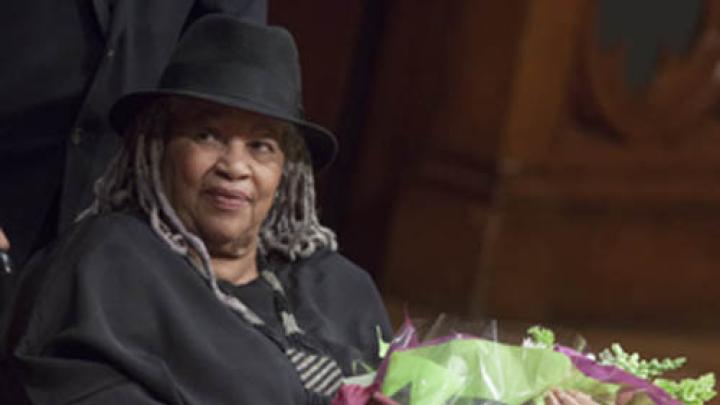It was a tragedy of extreme proportions: nine girls shot in a one-room Amish schoolhouse in Lancaster County, Pennsylvania. But what was perhaps more startling, Nobel Prize-winning author Toni Morrison, Litt.D. ’89, told her audience Thursday in Sanders Theatre, was the local community’s reaction in the aftermath.
In what the media deemed bizarre behavior, the Amish forgave the school shooter, refused to seek justice, and comforted the killer’s widow and children just as they embraced the relatives of the slain and wounded (five of the girls died; four survived). As Morrison followed the story, she couldn’t help but ponder the true meaning of “goodness.”
“[The community’s] silence following that slaughter, along with their very deep and sincere concern for the killer’s family, seemed to me at the time characteristic of genuine goodness—and so I became fascinated even then with the term and its definition,” said Morrison, who delivered the Harvard Divinity School’s 2012 Ingersoll Lecture on Immortality. “I wondered why the narrative quickly ignored the killer and the victims and focused exclusively on the shock of forgiveness.”
Morrison—professor emerita at Princeton, winner of the 1988 Pulitzer Prize for her novel Beloved, the 1993 Nobel Prize in Literature, and the 2012 Presidential Medal of Freedom—described how she has studied goodness by looking up various definitions and reading scholarly articles. Is altruism, she wondered, an instinctive act of selflessness, or is it taught and learned? Is it simply narcissism in disguise? As she read and pondered a plethora of definitions, she began to look at scientific interpretations and studies of goodness.
“Some of the most thought-provoking theories came from scholarship investigating the DNA—scientists seeking evidence of an embedded gene, automatically firing to enable the sacrifice of oneself for the benefit of others,” she said. “It was a brother or sister to Darwin’s survival of the fittest.”
She read about examples of altruism in the animal and insect kingdoms: squirrels squeaking to deliberately attract a predator’s attention to themselves in order to warn others; birds, bees, bats, and ants acting similarly, all in service to the collective. Such behavior, Morrison reported, is replicated among humans. But the question, she said, is whether such sacrifice is innate. “Is there a good gene,” she asked, “along with a selfish gene?”
And there can be no discussion of good, Morrison said, without also considering its counterpart—evil. “I’ve never been interested or impressed by evil itself,” she declared. “But I have been confounded by how attractive it is to others, and stunned by the attention given to its every whisper, its every shout. Evil has a blockbuster audience, while goodness lurks backstage.”
Morrison discussed the manifestations of and difference between good and evil in nineteenth- and twentieth-century literature, as well as in her own writing. In nineteenth-century books, she said, authors ended their stories with goodness as a virtue, whereas twentieth-century authors point out its weakness. She also pointed out examples of goodness in her own writing, such as the priest in Mercy who risks danger in order to help female slaves learn to read.
“Allowing goodness its own speech does not annihilate evil,” Morrison said. “But it does allow me to signify my own understanding of goodness. The acquisition of self-knowledge—a satisfactory ending for me—is when the protagonist has learned something vital and morally insightful about the killer that she or he did not know at the beginning.”








